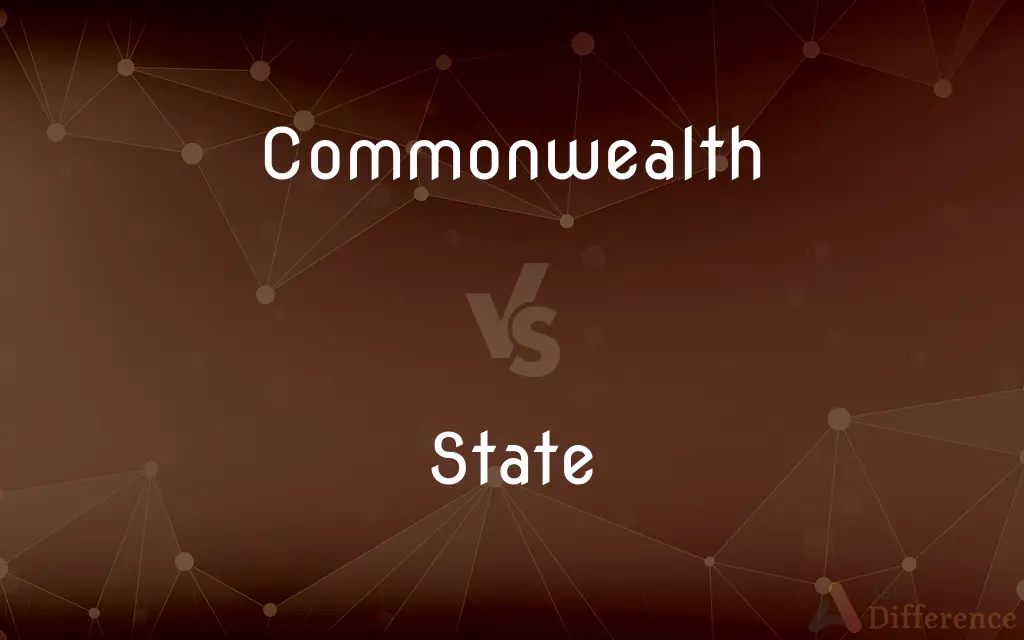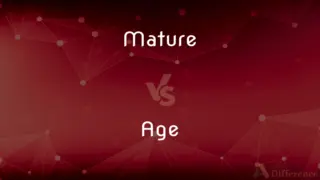Commonwealth vs. State — What's the Difference?
By Tayyaba Rehman — Updated on September 20, 2023
Commonwealth usually refers to a political association of some countries, often with shared histories, or to specific U.S. states that use the term for historical reasons.

Difference Between Commonwealth and State
Table of Contents
ADVERTISEMENT
Key Differences
Commonwealth can refer to several different political arrangements, such as an association of countries like the Commonwealth of Nations. A State, on the other hand, generally refers to a sovereign nation or a specific administrative division within a country. While Commonwealths often share cultural or historical links, States may or may not share such connections.
In the United States, the terms Commonwealth and State have particular meanings. Four states — Kentucky, Massachusetts, Pennsylvania, and Virginia — are officially known as Commonwealths. Despite this, in the U.S., there is no legal difference between a State and a Commonwealth. Both are considered equal under the law.
When talking about governance, Commonwealth often implies a focus on the common good or welfare of the people. State, in contrast, is a more neutral term that describes a governed population but doesn't inherently imply any specific focus on the well-being of its citizens. The governance mechanisms can be identical in both.
The terms Commonwealth and State can also differ in their international usage. Commonwealth is often used to describe nations that are part of an international association like the Commonwealth of Nations. State, however, is a more universally recognized term that can apply to any sovereign country in the international arena.
Comparison Chart
General Meaning
Political association
Sovereign entity
ADVERTISEMENT
U.S. Context
4 U.S. states use term
50 U.S. states
Governance Focus
Often common good
Neutral
Legal Status (in U.S.)
Equal to a State
Standard term
International Usage
Commonwealth of Nations
Universally recognized
Compare with Definitions
Commonwealth
A term for the public welfare.
For the commonwealth of the people, laws are created.
State
A division within a country.
Florida is a state in the U.S.
Commonwealth
A political entity focused on common good.
The Commonwealth prioritizes public welfare.
State
A condition or quality.
He was in a state of happiness.
Commonwealth
A historical form of government.
The Commonwealth era in England was unique.
State
A ceremony or formal occasion.
They held a state dinner.
Commonwealth
A commonwealth is a traditional English term for a political community founded for the common good. Historically it has sometimes been synonymous with "republic".
State
A condition or mode of being, as with regard to circumstances
The office was in a state of confusion.
Commonwealth
The people of a nation or state; the body politic.
State
A condition of being in a stage or form, as of structure, growth, or development
The fetal state.
Commonwealth
A nation or state governed by the people; a republic.
State
A mental or emotional condition
In a manic state.
Commonwealth
Used to refer to some US states, namely, Kentucky, Massachusetts, Pennsylvania, and Virginia.
State
(Informal) A condition of excitement or distress
Was in a state over going to the prom.
Commonwealth
Used to refer to a self-governing, autonomous political unit voluntarily associated with the United States, namely, Puerto Rico and the Northern Mariana Islands.
State
Social position or rank.
Commonwealth
Often Commonwealth The Commonwealth of Nations.
State
(Physics) The condition of a physical system with regard to phase, form, composition, or structure
Ice is the solid state of water.
Commonwealth
The English state and government from the death of Charles I in 1649 to the restoration of the monarchy in 1660, including the Protectorate of 1653 to 1659.
State
Ceremony; pomp
Foreign leaders dining in state at the White House.
Commonwealth
(Archaic) The public good; commonweal.
State
The supreme public power within a sovereign political entity
The state intervening in the economy.
Commonwealth
The well-being of a community.
State
The sphere of supreme civil power within a given polity
Matters of state.
Commonwealth
The entirety of a (secular) society, a polity, a state.
State
A specific kind of government
The socialist state.
Commonwealth
Republic. Often capitalized, as Commonwealth.
State
A body politic, especially one constituting a nation
The states of Eastern Europe.
Commonwealth
A state; a body politic consisting of a certain number of men, united, by compact or tacit agreement, under one form of government and system of laws.
The trappings of a monarchy would set up an ordinary commonwealth.
State
One of the more or less internally autonomous territorial and political units composing a federation under a sovereign government
The 48 contiguous states of the Union.
Commonwealth
The whole body of people in a state; the public.
State
Of or relating to a body politic or to an internally autonomous territorial or political unit constituting a federation under one government
A monarch dealing with state matters.
The department that handles state security.
Commonwealth
Specifically, the form of government established on the death of Charles I., in 1649, which existed under Oliver Cromwell and his son Richard, ending with the abdication of the latter in 1659.
State
Owned and operated by a state
State universities.
Commonwealth
The official name of some states in the United States (Massachusetts and Pennsylvania and Virginia and Kentucky) and associated territories (Puerto Rico)
State
To set forth in words; declare.
Commonwealth
A politically organized body of people under a single government;
The state has elected a new president
African nations
Students who had come to the nation's capitol
The country's largest manufacturer
An industrialized land
State
A condition; a set of circumstances applying at any given time.
A state of being
A state of emergency
Commonwealth
A world organization of autonomous states that are united in allegiance to a central power but are not subordinate to it or to one another
State
(physics) A complete description of a system, consisting of parameters that determine all properties of the system.
Commonwealth
A political system in which the supreme power lies in a body of citizens who can elect people to represent them
State
A mess; disorder.
Absolute state
In a state
Commonwealth
An association of sovereign nations.
India is a part of the Commonwealth of Nations.
State
(computing) The stable condition of a processor during a particular clock cycle.
In the fetch state, the address of the next instruction is placed on the address bus.
Commonwealth
A U.S. state with a historical title.
Virginia is known as a Commonwealth.
State
(computing) The set of all parameters relevant to a computation.
The state here includes a set containing all names seen so far.
State
(computing) The values of all parameters at some point in a computation.
A debugger can show the state of a program at any breakpoint.
State
(sciences) The physical property of matter as solid, liquid, gas or plasma.
State
(obsolete) Highest and stationary condition, as that of maturity between growth and decline, or as that of crisis between the increase and the abating of a disease; height; acme.
State
High social standing or circumstance.
State
Pomp, ceremony, or dignity.
In state
The President's body will lie in state at the Capitol.
State
Rank; condition; quality.
State
Condition of prosperity or grandeur; wealthy or prosperous circumstances; social importance.
State
A chair with a canopy above it, often standing on a dais; a seat of dignity; also, the canopy itself.
State
(obsolete) A great person, a dignitary; a lord or prince.
State
(obsolete) Estate, possession.
State
A polity.
State
Any sovereign polity; a national or city-state government.
State
A political division of a federation retaining a notable degree of autonomy, as in the United States, Mexico, Nigeria, or India.
State
(obsolete) A form of government other than a monarchy.
State
(anthropology) A society larger than a tribe. A society large enough to form a state in the sense of a government.
State
An element of the range of the random variables that define a random process.
State
The lexical aspect (aktionsart) of verbs or predicates that do not change over time.
State
(transitive) To declare to be a fact.
He stated that he was willing to help.
State
(transitive) To make known.
State your intentions.
State
(obsolete) Stately.
State
The circumstances or condition of a being or thing at any given time.
State is a term nearly synonymous with "mode," but of a meaning more extensive, and is not exclusively limited to the mutable and contingent.
Declare the past and present state of things.
Keep the state of the question in your eye.
State
Rank; condition; quality; as, the state of honor.
Thy honor, state, and seat is due to me.
State
Condition of prosperity or grandeur; wealthy or prosperous circumstances; social importance.
She instructed him how he should keep state, and yet with a modest sense of his misfortunes.
Can this imperious lord forget to reign,Quit all his state, descend, and serve again?
State
Appearance of grandeur or dignity; pomp.
Where least of state there most of love is shown.
State
A chair with a canopy above it, often standing on a dais; a seat of dignity; also, the canopy itself.
His high throne, . . . under stateOf richest texture spread.
When he went to court, he used to kick away the state, and sit down by his prince cheek by jowl.
State
Estate; possession.
Your state, my lord, again is yours.
State
A person of high rank.
State
The principal persons in a government.
The bold designPleased highly those infernal states.
State
The bodies that constitute the legislature of a country; as, the States-general of Holland.
State
A form of government which is not monarchial, as a republic.
Well monarchies may own religion's name,But states are atheists in their very fame.
State
A political body, or body politic; the whole body of people who are united under one government, whatever may be the form of the government; a nation.
Municipal law is a rule of conduct prescribed by the supreme power in a state.
The Puritans in the reign of Mary, driven from their homes, sought an asylum in Geneva, where they found a state without a king, and a church without a bishop.
State
In the United States, one of the commonwealths, or bodies politic, the people of which make up the body of the nation, and which, under the national constitution, stand in certain specified relations with the national government, and are invested, as commonwealths, with full power in their several spheres over all matters not expressly inhibited.
State
Highest and stationary condition, as that of maturity between growth and decline, or as that of crisis between the increase and the abating of a disease; height; acme.
I do not, brother,Infer as if I thought my sister's stateSecure without all doubt or controversy.
We hoped to enjoy with ease what, in our situation, might be called the luxuries of life.
And, O, what man's condition can be worseThan his whom plenty starves and blessings curse?
State
A statement; also, a document containing a statement.
State
Stately.
State
Belonging to the state, or body politic; public.
State
To set; to settle; to establish.
I myself, though meanest stated,And in court now almost hated.
Who calls the council, states the certain day.
State
To express the particulars of; to set down in detail or in gross; to represent fully in words; to narrate; to recite; as, to state the facts of a case, one's opinion, etc.
State
The group of people comprising the government of a sovereign state;
The state has lowered its income tax
State
The territory occupied by one of the constituent administrative districts of a nation;
His state is in the deep south
State
A politically organized body of people under a single government;
The state has elected a new president
African nations
Students who had come to the nation's capitol
The country's largest manufacturer
An industrialized land
State
The way something is with respect to its main attributes;
The current state of knowledge
His state of health
In a weak financial state
State
The federal department in the UnitedStates that sets and maintains foreign policies;
The Department of State was created in 1789
State
The territory occupied by a nation;
He returned to the land of his birth
He visited several European countries
State
A state of depression or agitation;
He was in such a state you just couldn't reason with him
State
(chemistry) the three traditional states of matter are solids (fixed shape and volume) and liquids (fixed volume and shaped by the container) and gases (filling the container);
The solid state of water is called ice
State
Express in words;
He said that he wanted to marry her
Tell me what is bothering you
State your opinion
State your name
State
Put before;
I submit to you that the accused is guilty
State
Indicate through a symbol, formula, etc.;
Can you express this distance in kilometers?
State
A sovereign political entity.
Germany is a federal state.
State
Government or political organization.
Separation of church and state is important.
Common Curiosities
Are all U.S. states Commonwealths?
No, only four U.S. states are officially known as Commonwealths.
What is a State?
A State can refer to a sovereign nation or a specific administrative division within a nation.
Is there a legal difference between a Commonwealth and a State in the U.S.?
No, there is no legal difference in the U.S.
Is State a universally recognized term?
Yes, the term State is internationally understood to mean a sovereign entity.
What is a Commonwealth?
A Commonwealth can be an association of nations or a specific type of U.S. state.
How many types of Commonwealths are there?
Multiple, including international associations and historical forms of government.
What are some examples of Commonwealth countries?
Examples include Canada, Australia, and India.
Does Commonwealth have historical connotations?
Yes, the term has been used historically to describe certain forms of government.
Does Commonwealth imply a focus on public welfare?
Often, yes. The term suggests a focus on the common good.
What is the State's role in governance?
The State typically provides governance and public services to its citizens.
Is every country a State?
Generally, yes. Every sovereign nation is considered a State.
Is the term State used in international law?
Yes, it is a recognized term in international law to describe sovereign entities.
Can Commonwealth refer to an international association?
Yes, like the Commonwealth of Nations.
Do Commonwealths exist outside the Commonwealth of Nations?
Yes, the term can also refer to U.S. states like Virginia, or historical periods like the Commonwealth era in England.
How many States are in the U.S.?
There are 50 States in the U.S.
Share Your Discovery

Previous Comparison
Mature vs. Age
Next Comparison
Ask vs. GiveAuthor Spotlight
Written by
Tayyaba RehmanTayyaba Rehman is a distinguished writer, currently serving as a primary contributor to askdifference.com. As a researcher in semantics and etymology, Tayyaba's passion for the complexity of languages and their distinctions has found a perfect home on the platform. Tayyaba delves into the intricacies of language, distinguishing between commonly confused words and phrases, thereby providing clarity for readers worldwide.
















































